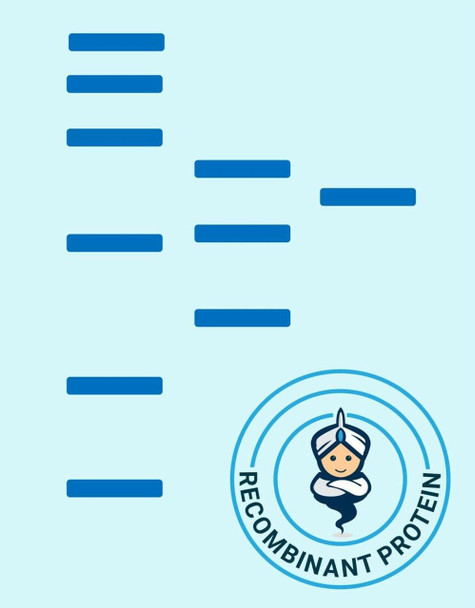Description
| Product Name: | Mouse BAFF Recombinant Protein (N-His) (active) |
| Product Code: | RPES6708 |
| Size: | 20µg |
| Species: | Mouse |
| Expression Host: | E.coli |
| Synonyms: | p40 cytokine, T-cell growth factor p40 |
| Mol Mass: | 35.02 kDa |
| Tag: | N-His |
| Purity: | > 98 % as determined by reducing SDS-PAGE. |
| Endotoxin Level: | < 0.1 EU per μg of the protein as determined by the LAL method. |
| Bio Activity: | Measure by its ability to induce proliferation in mouse B cells. The ED50 for this effect is < 0.5 ng/mL. The specific activity of recombinant mouse BAFF is > 2 x 106IU/mg. |
| Sequence: | MDESAKTLPPPCLCFCSEKGEDMKVGYDPITPQKEEGAWFGICRDGRLLAATLLLALLSSSFTAMSLYQLAALQADLMNLRMELQSYRGSATPAAAGAPELTAGVKLLTPAAPRPHNSSRGHRNRRAFQGPEETEQDVDLSAPPAPCLPGCRHSQHDDNGMNLRNIIQDCLQLIADSDTPTIRKGTYTFVPWLLSFKRGNALEEKENKIVVRQTGYFFIYSQVLYTDPIFAMGHVIQRKKVHVFGDELSLVTLFRCIQNMPKTLPNNSCYSAGIARLEEGDEIQLAIPRENAQISRNGDDTFFGALKLL |
| Accession: | Q9WU72 |
| Storage: | Generally, lyophilized proteins are stable for up to 12 months when stored at -20 to -80°C. Reconstituted protein solution can be stored at 4-8°C for 2-7 days. Aliquots of reconstituted samples are stable at < -20°C for 3 months. |
| Shipping: | This product is provided as lyophilized powder which is shipped with ice packs. |
| Formulation: | Lyophilized from sterile PBS, pH 7.4 Normally 5 % - 8 % trehalose, mannitol and 0.01% Tween80 are added as protectants before lyophilization. Please refer to the specific buffer information in the printed manual. |
| Reconstitution: | Please refer to the printed manual for detailed information. |
| Background: | TNFSF13B/TNFSF20 belongs to the tumor necrosis factor family. It abundantly is expressed in peripheral blood Leukocytes and is specifically expressed in monocytes and macrophages. Also found in the spleen, lymph node, bone marrow, T-cells and dendritic cells. A lower expression seen in placenta, heart, lung, fetal liver, thymus, and pancreas. Isoform 2 is expressed in many myeloid cell lines. A third B-cell specific BAFF-receptor (BAFFR/BR3) promotes the survival of mature B-cells and the B-cell response. Isoform 2 seems to inhibit isoform 1 secretion and bioactivity. Isoform 3 acts as a transcription factor for its own parent gene, in association with NF-kappa-B p50 subunit, at least in autoimmune and proliferative B-cell diseases. The presence of Delta4BAFF is essential for soluble BAFF release by IFNG/IFN-gamma-stimulated monocytes and for B-cell survival. It can directly or indirectly regulate the differential expression of a large number of genes involved in the innate immune response and the regulation of apoptosis. Isoform 2 heteromultimerizes with isoform 1, probably limiting the amount of functional isoform 1 on the cell surface. Isoform 3 is unlikely form trimers or bind to BAFF receptors. Mature human BAFF consists of a 46 amino acid (aa) cytoplasmic domain, a 21 aa transmembrane segment, and a 218 aa extracellular domain (ECD) with a stalk region and one TNF-like domain. Within aa 134-285 of the ECD, human BAFF shares 72% aa sequence identity with mouse BAFF. |






